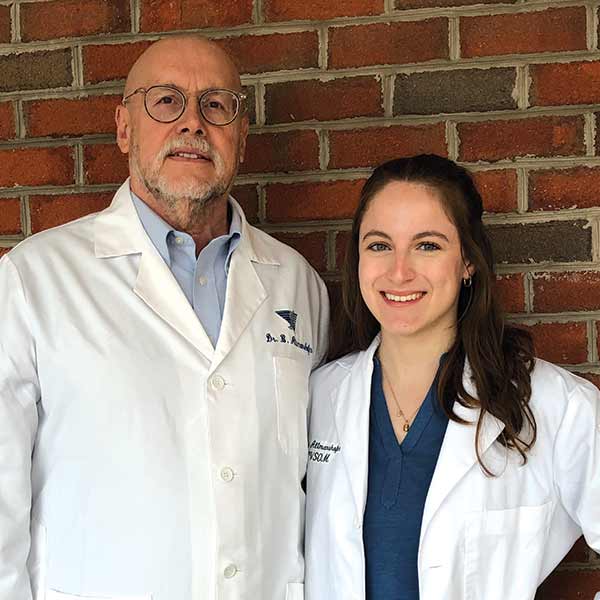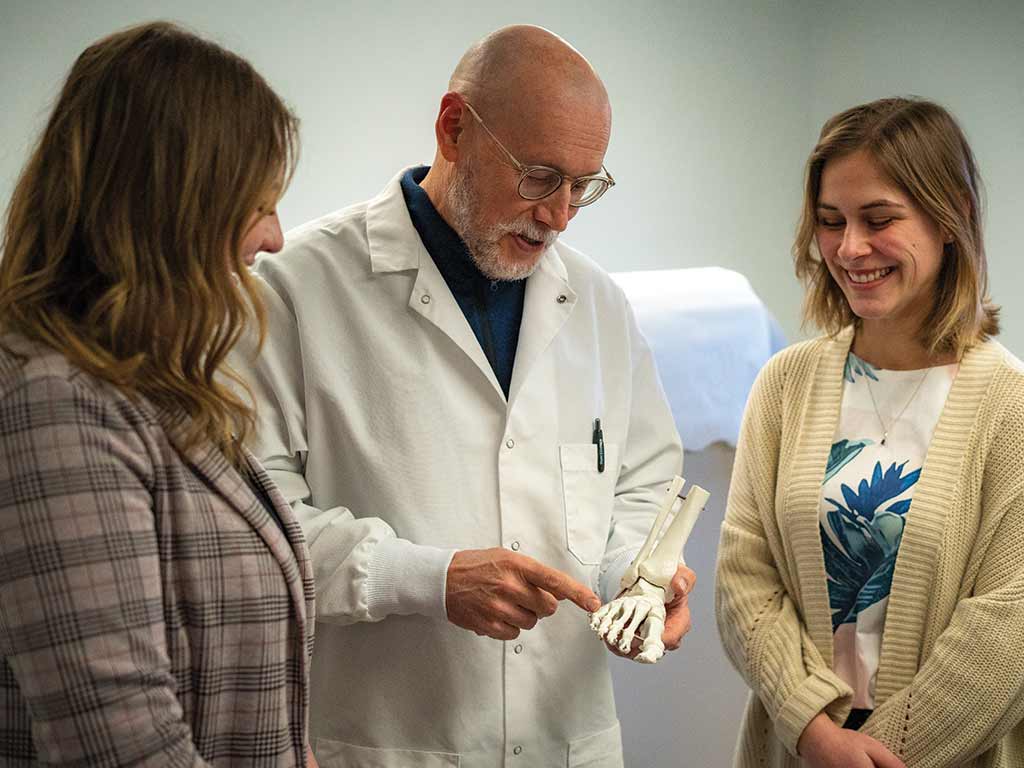Duncansville podiatrist Dr. Bert Altmanshofer ’81 used to make rounds at a local community hospital with young daughter Kate at his side, and, while he examined his patients and their wounds, she took note of dad’s temperament.
“Seeing him in public, seeing that people are so trusting of him and willing to communicate with him, and seeing that he’s so friendly and open, that taught me a lot about dealing with patients in smaller populations,” said Kate Altmanshofer ’21, whose interest in attending Juniata was spurred by campus trips alongside her father.
Though unintentional, Bert instilled in Kate an understanding of the unique medical challenges faced by people in rural populations—as well as the desire to connect with each person to bring more quality care to their community. She is now a student at the West Virginia School of Osteopathic Medicine in Lewisburg, WV, eager to forge her own path in medicine, grounded in a Juniata education, and guided by her father’s example.
“I was fortunate to have a choice in where I attended in medical school, but I chose a school that reminds me a lot of Juniata,” Kate said. “It’s a small school. You get to talk to your professors. It just felt like the right choice for me.

“She picked the West Virginia School of Osteopathic Medicine because of its focus on rural care,” said Bert, who once worked in neighboring Altoona, one of the largest communities in the area. He now works in small rural clinics in Huntingdon County, continuing to specialize in such areas as wound care, foot and ankle pain, and diabetic foot problems.
He now treats people who once had to travel to Altoona for their foot care. During a recent snowstorm, Bert made three local home visits. He said to this day, he relishes patients saying, “Thank you.”
“I always dabbled in the rural health care process,” Bert said, “and that’s where I spend my efforts now, trying to create the awareness that we can go to the ‘woods’ and deliver more care. For a lot of these folks that I’m treating now, I’ve treated members of their families when they came to the ‘big’ town to see me.
“Now I am able to use that skillset and provide evaluations, wound care, and treatment plans,” Bert added. “We can provide that small office surgery care instead of them having a major trip to a larger area for many minor surgeries of the foot and ankle.”
Bert says during his time at Juniata, student pre-professional health clubs visited newly constructed rural clinics. These visits included an introduction to rural healthcare recruitment by the National Health Service Corps and other local groups that recruit physicians.
Bert says regardless of where doctors train, educating community members is key to improving health outcomes in rural areas. That includes patients and providers in an area prone to increased severity of ailments such as diabetes mellitus, peripheral vascular disease, aging, limited ambulation, and obesity.
According to Pennsylvania’s County Health Profiles, Huntingdon County’s diabetes mellitus death rate is the only cause of death that exceeds the state average. Bert and Kate share concerns about the area’s prevalence of the disease, which can lead to heart and kidney problems as well as impaired vision and limb amputation.
“I think one of the biggest concerns is getting them onto the appropriate specialists,” Bert said. “I get a lot of folks that now, in 2024, have never seen a foot and ankle care provider, and they are in their 70s or 80s with substantial health issues.”
“Those in rural areas are underserved in specific ways that are unique to geography, culture, heritage and so forth,” said Kate. “As a provider, it’s important to be cognizant of these special things that impact these areas and bring to the table your expertise to help work with these populations and help improve health outcomes.”
As a child, Kate said she always envisioned becoming a doctor. But that vision crystalized when she took part in Juniata’s bioethics secondary emphasis, which prepares students in biology, health and other professions to resolve ethical dilemmas and amplifies disparities in the healthcare system and social determinants of health.
The secondary emphasis includes required courses such as Science and Human Values and Justice, which explores ethical obligations of scientists to society as well as the role that technology, as a form of applied science, plays in everyday lives.
“That’s when it clicked for me,” Kate said about the secondary emphasis. “That’s when I said, ‘Oh, this is where I can make a difference; I can take the things I’m learning here and the things that I’ll learn in med school into a community with me.’”
Kate said that when she told her father of her goal to become a doctor, “He was very excited and very proud, but he also told me to be smart, work hard, know what you’re getting into, because it’s a lifelong learning dedication.”
Already her father’s tutelage and her Juniata schooling have helped prepare Kate for lifelong learning, enabling her to see how one impaired organ can affect the entire body.
“The body is truly a unit,” Kate said. “And even if you’re just going to a podiatrist to get your feet looked at, that can have implications on your endocrine system. Everything is connected.”
Kate says that though she has not yet mapped out her post-medical school plans, she’s already considering a return to Huntingdon County. Going on rounds with her dad as a child enabled her to get comfortable with talking to other providers, patients, and patient’s families. The opportunity to do so as a doctor would be too good to pass up.
“It’s definitely a consideration,” Kate added. “It’s where I grew up, where I went to school. Those areas all served me and helped me become the person I am, so I think it would be very special to give back to those communities.”





